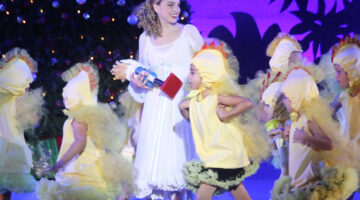‘Other Desert Cities’ Rips Into Family Values
During a downpour outside on opening night, Jon Robin Baitz’s “Other Desert Cities” came to full bloom on Thursday before a vibrant audience at Waterfront Playhouse.
Taking place in the Palm Springs home of the Wyeth family, “very rich and absurdly white,” the set is of course by Waterfront’s brilliant designer Michael Boyer, who’s come up with a big room in a big house of rock walls and great wooden beams and a mammoth window that shows the desert sunrise and the stars at night.
The play is ostensibly about a manuscript although it’s actually about the travesty of war. Not easy baggage to handle but it’s directed by Danny Weathers, so we’re in good hands and things flare into life from the outset.
The Wyeths, Lyman (Tom Murtha) and Polly (Chris Stone), are old guard Hollywood. He starred as gunslingers and gumshoes and ended up as an ambassador. She wrote scripts. Their two children on a Christmas Eve visit, who call their parents by their first names, are Brooke (George diBraud), a writer, and Trip (Michael Aaglan), a TV producer. A third child, Harry, is at the heart of the story and the subject of a manuscript already accepted by the first publishers Brooke sent it to but that has only been only been seen within the family by Polly’s sister Side (Rita Brown Troxel).
“You did bring it with you?” Brooke is asked straight away. Well, yes. Two copies, in fact. This is hazardous. “I’m so tired of living in the indentured servitude of having a family,” explains Brooke. Asks her mom, she of the far Republican right, “You know what I believe in, aside from the right to bear arms?”
The play begins in 2004, referred to as the “anthrax era.” Much of its talk is about the 1970s, the Vietnam era. It actually ends (and you’ll never guess how) in 2010. Again, a lot of baggage for our adroit director.
Is it a comedy? The jokes fly fast and furious and a lot of types are at the butt of them, from librarians in Kabul to Pilipino nurses and lesbians and even the British. Playwright Baitz created a TV series that ran for five seasons and wrote episodes of “West Wing” among other shows so he’s quick with the flip side.
But there’s plenty of angst engendered by Brooke’s manuscript to sharpen the laughs. As in “Osage County,” a previous hit at Waterfront, there’s a lot of pill popping (to knowing nods from the audience) and a couple of the characters are fresh out of rehab and hospitalization. As is pointed out by the ambassador, “drugs destroyed the American century.” Also bringing a knowing nod from audience members is the line, “Money never made things happier, remember?”
The biggest laughs in the show, however, despite the story’s lofty heights, came from Trip rolling a joint on a framed portrait of Nancy Reagan, Silda’s exclamation from the deepest sleep, “I smell pot!” and Trip’s “What I’d like are some M&Ms.”
However, it is the serious side that wins out.
“You must give people room to maneuver,” pleads the father of his daughter.
“That’s a scary kiss,” says the daughter to the mother.
And, inevitably, there’s the hug from behind, so symptomatic of a divided but desperate love.
A deadly serious drama yet also about living and thriving. It’s a talkathon, yes, but the highlight speeches are great. Perhaps the best comes from Trip, who direly warns at a critical point, “We’re heading towards desolation.” Desolation, a haunting echo of the highway sign beyond Palm Springs that points dismissively to Other Desert Cities.
The performances are all outstanding, maintaining a Waterfront tradition of actors who can keep in character and deliver the goods through the most challenging of circumstances.
George diBraud, forever young, is utterly convincing as the thwarted author who brings the play to a high note at the very end.
Chris Stone as the mom triumphs in her part, as does Tom Murtha in his as the dad. You’ll believe them, and in them, throughout; incredible work from them both.
Rita Brown Troxel has fun in her role, with the best, most impassioned speech of the first part. Michael Aaglan has the best speech in the latter part and he triumphs too. This performance is definitely one for his growing resumé.
Kudos to David Bird who does the lighting; to Carmen Rodriguez, costume designer and props mistress; and to stage manager J. B. McLendon.
“Other Desert Cities” runs at Waterfront Playhouse through February 15.
[livemarket market_name="KONK Life LiveMarket" limit=3 category=“” show_signup=0 show_more=0]





No Comment